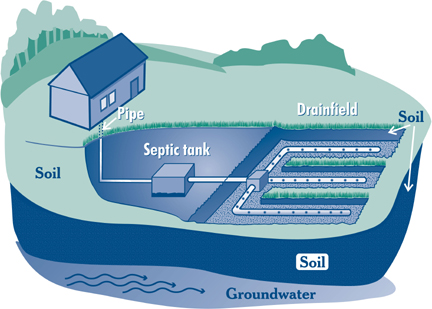Sandfilter Systems
Lincoln County currently allows the use of sandfilter systems. This system
was designed because many properties were too small to install a conventional
septic system. This system has a septic tank which is pumped into a huge
concrete box that must hold a minimum of 360 cu. ft. of sand. The gray water
is filtered through the sand and comes out into a drainfield of approximately
90 lineal ft/per bedroom. At this point it may be necessary to have another
pump to move this water to the drainfield, depending on how the property
lies, the slope, etc.
Properties around Devils Lake are now becoming buildable
because of this system, and there are installations of it for new home
construction and for replacement of faulty systems. The system is costly; an
estimated
$10,000 to $15,000. The huge concrete box is unsightly in many instances,
and as any system, some seepage will still enter the lake. The system needs
to be maintained at a cost to the homeowner.
PADL appreciates that folks are now able to use a system
that will allow property owners to make use of their land, and that failed
systems are being addressed with its use. But, this does not alleviate the
problem for properties (of which many exist) that are too small to put
this type of system in or change the fact that when a sewer system is eventually
put in place, all these Sandfilter Systems will have to be removed at no
small expense and the property connected to the Sewer System at additional
cost. Therefore, we feel that a sewer system surrounding Devils Lake at
the nearest possible time is the real answer. The PADL board has been working
very hard to help with various problems with this project, including design,
costs, legal issues, and financial aid
The PADL board asks for your support in the undertaking
of a sewer system not only because it is an inevitable improvement that
our lake requires for its preservation, but also because in the long run
the cost of a sewer system may be less than the cost of ongoing maintenance
of septic or alternative on site systems.
|
|
Pharmaceuticals
and health care products down the toilet and sink
Scientists have begun to study wastewater for pollution from pharmaceutical
and health care product chemicals. Fish and wildlife habitat downstream from
septic and sandfilter drainfields, and sewer plants are at risk for contamination.
Most current sewer systems do not remove chemicals that could be harmful to the
environment. Removing chemicals would require an additional treatment step and
cost. An example would be prozac chemicals discharged from a sewer plant into
a nearby stream where fish live. It could make for happy fish, or cause serious
problems. Antibiotics from wastewater in septic tanks can kill the bacteria that
are needed to make septic systems work.
|
 Lincoln City's wastewater consultant is Dale Richwine. If you have
questions or input contact Richwine Environmental at 503-617-1721.
Lincoln City's wastewater consultant is Dale Richwine. If you have
questions or input contact Richwine Environmental at 503-617-1721.